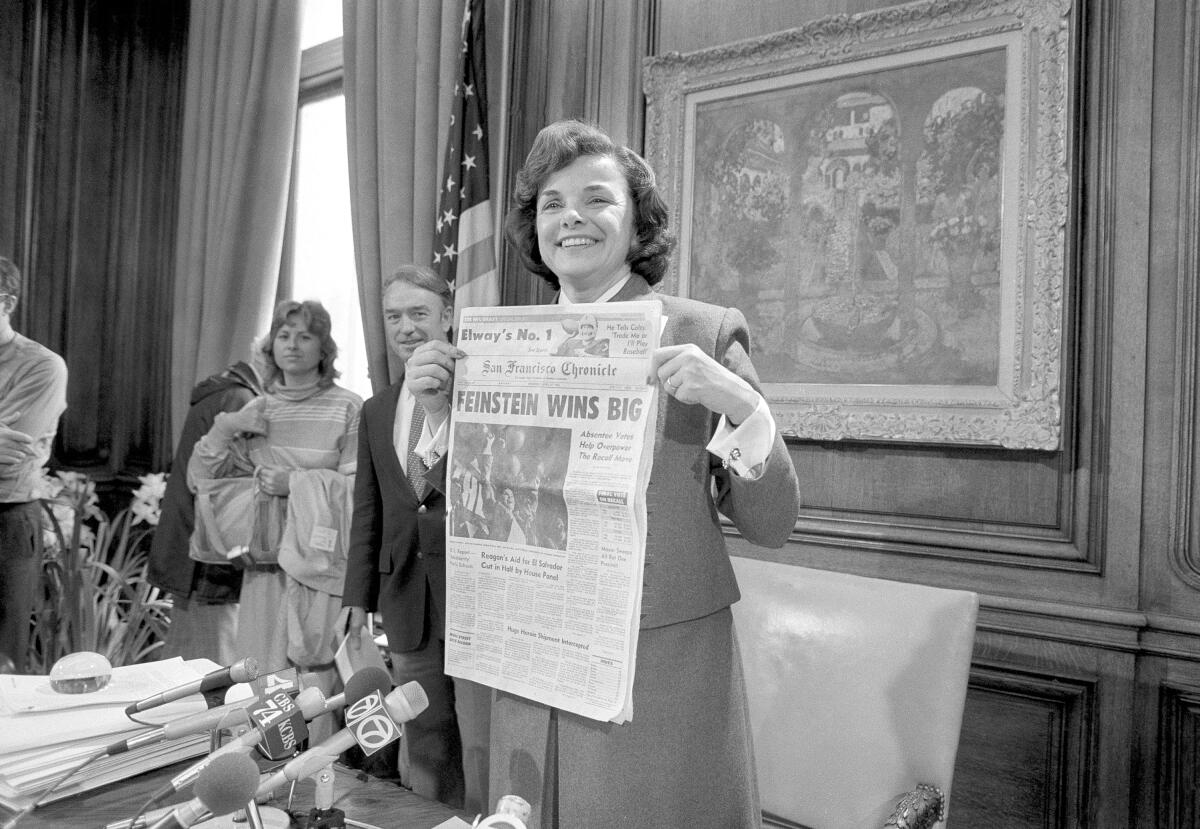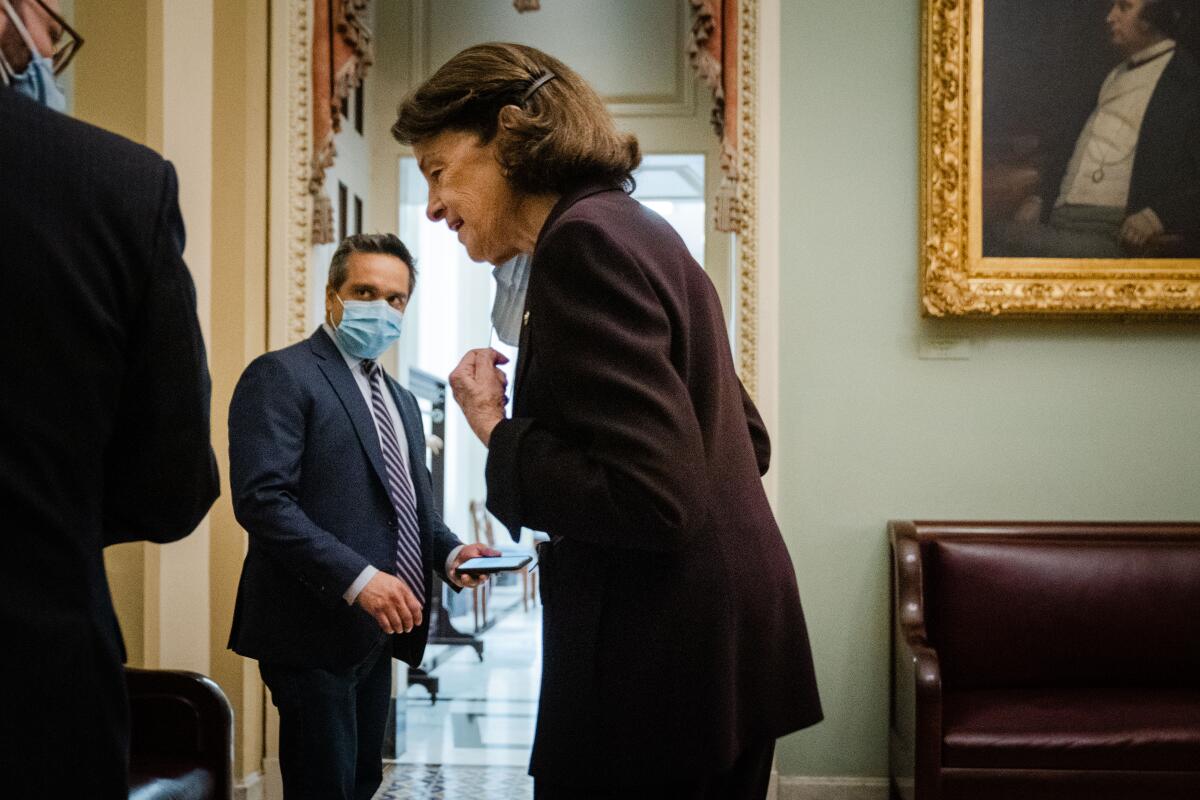Column: In Sen. Feinstein’s death, lessons for all of us about when to leave work behind

In her “Introduction to Gerontology” class, USC professor Caroline Cicero shows her students a CNN profile of Sen. Dianne Feinstein that first aired in 2017.
“It’s what I’m meant to do,” Feinstein said of her many years of public service, which included stints as San Francisco supervisor and mayor.
Feinstein then pointed to her head and completed the thought:
“As long as the old bean holds up,” she added.
I admired her resolve. But Feinstein, who died last week at the age of 90, was still on the job despite concerns among many that the old bean hadn’t held up.
Cicero uses that video — which reviews the 1978 assassinations of San Francisco Mayor George Moscone and Supervisor Harvey Milk and the role that tragedy played in Feinstein’s rise to power and her embrace of gun control legislation — to spark conversations about longevity.
California is about to be hit by an aging population wave, and Steve Lopez is riding it. His column focuses on the blessings and burdens of advancing age — and how some folks are challenging the stigma associated with older adults.
“In the case of Sen. Feinstein and so many,” Cicero said, “their identity is wrapped up in the work they do, and yes, I believe that many people don’t retire because they don’t know what else they would do.”
Cicero repeated a comment she first made to me a few months ago, when I wrote that it was time for Feinstein — whose physical and cognitive condition had obviously faded — to let go.
“I think we need to give people a chance to retire,” Cicero said, adding that as people approach the twilight of their careers, they need to consider “who they’ll be after retirement.”
I struggled with those very considerations a couple of years ago while researching my book “Independence Day: What I Learned About Retirement, From Some Who’ve Done It and Some Who Never Will.” The research was part of my own process of deciding whether I was ready to retire, and in the end, I wanted to keep going.
In reality, as the global population of older adults grows in what some have referred to as the silver tsunami, millions of people don’t have the luxury of such a choice. They work because they can’t afford not to. But others keep working because they can’t figure out what else to do with their time, or simply because they love what they do.
Father Gregory Boyle, who helps young men and women redirect their lives after gangs and prison, made a big impression on me when I asked if he ever considered retirement.
“You wanna stay anchored in loving and tethered to a sustaining God and … be mindful of the goodness in people. For me, that’s eternally replenishing, and you have to do what replenishes you,” Boyle told me, adding one last thought:
“Jesuits retire in the graveyard.”
Boyle and I are roughly the same age (I’m almost 70), and so is California winemaker Randall Grahm, who has been called the Rhone Ranger. When I met with Grahm on his land in San Juan Bautista, where he’s trying to develop a climate change-resistant grape, he had the same outlook as Boyle, and wondered why I’d retire from a job in which I was getting paid to drink wine with him in the middle of a lovely day.
“I’m going to die in the vineyard,” Grahm said.
Because of the book and my Golden State column, I frequently hear from people in the midst of making the big decisions about when and how to create second chapters for themselves. Paul Silverman, a Ventura County urologist, has emailed me and we’ve talked on the phone about his struggle in weighing the benefits of work against the advantages and uncertainties of retirement.
Silverman, 68, has finally made his decision.
“I’ve had a terrific career, but I have come to grips with the changing times in medicine, my health, my limitations, and some classic ‘burnout’ that I’m sure you have heard about,” Silverman said. “I’m still working part time and plan to wind down completely by the end of the year now that I know my patients will be left in better hands than my own.”
Feinstein had said the current term would be her last. But you have to wonder whether, as her health deteriorated before and during her last term, she was able to think clearly about those kinds of considerations. Or whether loved ones, friends and staffers were able to help her confront those issues.
Even when you’re of sound mind, it can be difficult to know when to let go. For my book, I profiled an Orange County paralegal named Jane, who believed at 66 that it was time to close out her career. Her workmates threw her a going-away party on a Friday. On the following Monday, “I realized it was 8 a.m. and I was all dressed up with no place to go,” Jane said.
By the end of the week, Jane asked if she could have her job back, and she worked another three years before hanging it up for good.
When work and identity are one and the same, it can be hard to walk away. As a kid in the Bay Area, I was a big fan of San Francisco Giants Hall of Famer Willie Mays. But he’s a classic example of someone who stayed on the job long after his skills had waned, and it was sad to see.
Same with Feinstein.
“I have to say it broke my heart, because I saw her diminishing in the eyes of the public … and that would be their last memory of her,” said Helen Dennis, a Los Angeles-based public speaker, columnist and advocate for aging well in work and beyond.

Dennis is co-founder of Project Renewment, which brings professional women together to talk about work and what comes next, and she’s co-author of “Project Renewment: The First Retirement Model for Career Women.” I asked her what advice she would have given Feinstein before her declining health got in the way of her work.
“I think I would have asked her what she thought would be the risks — the gains and losses — of continuing in her role,” Dennis said. “What would she be sacrificing if she left, and what would she be gaining if she stayed?”
That’s good advice for all of us, including Kentucky Sen. Mitch McConnell and President Biden. It’s not a question of age, for them or anyone else; it’s about health and ability.
And it’s worth remembering that as difficult as it might be for some people to cut the cord, rich experiences await many who make more time for family and friends, find purpose and gratification in volunteering, take on new adventures or even second careers, or simply take time to relax and reflect.
“Work is not life,” Cicero said, and “life is not work.”
More to Read
Sign up for Essential California
The most important California stories and recommendations in your inbox every morning.
You may occasionally receive promotional content from the Los Angeles Times.











